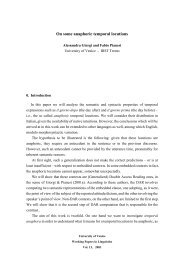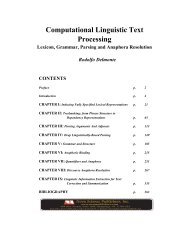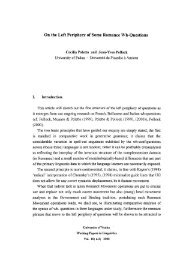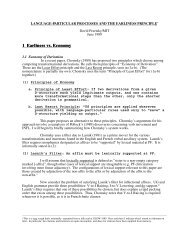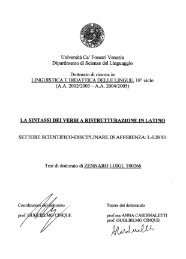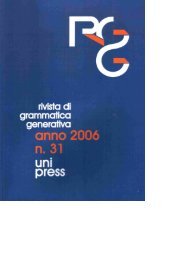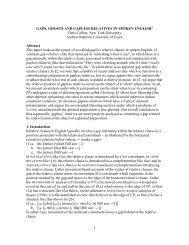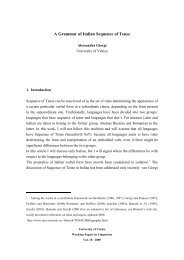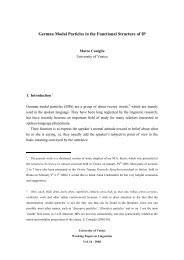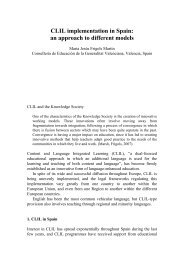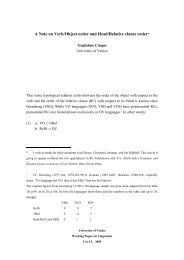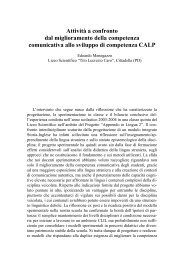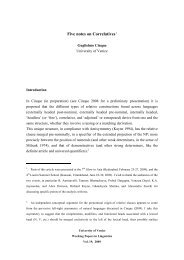Chinese relative clauses: restrictive, descriptive or appositive? - Lear
Chinese relative clauses: restrictive, descriptive or appositive? - Lear
Chinese relative clauses: restrictive, descriptive or appositive? - Lear
You also want an ePaper? Increase the reach of your titles
YUMPU automatically turns print PDFs into web optimized ePapers that Google loves.
FRANCESCA DEL GOBBO<br />
(12) The woman that lost her luggage on the flight from Ithaca to New<br />
Y<strong>or</strong>k was pretty upset.<br />
The infelicitous result of uttering (12) after (11) is due to the fact that,<br />
because of the definite determiner in (12), the content of the <strong>restrictive</strong><br />
<strong>relative</strong> clause is presupposed, hence taken f<strong>or</strong> granted. But nothing in the<br />
context provided in (11) tells us that the woman lost her luggage. Thus, a<br />
<strong>restrictive</strong> <strong>relative</strong> clause with a definite determiner cannot be uttered<br />
felicitously after a sentence that does not take its truth f<strong>or</strong> granted.<br />
In <strong>Chinese</strong>, we find that the utterance of a <strong>relative</strong> clause modifying a<br />
definite nominal in a context that does not take the truth of the <strong>relative</strong> f<strong>or</strong><br />
granted does not yield a felicitous result. Consider the following group of<br />
sentences:<br />
(13) a. Na-ge [RC zai cong Beijing dao NiuYue lutu zhong diu-le<br />
that-CL in from Beijing to New Y<strong>or</strong>k travel middle lost-LE<br />
xingli de] nuren xihuan zuo huoche.<br />
luggage DE woman like sit train<br />
‘That woman who lost her luggage on the flight from Beijing to<br />
New Y<strong>or</strong>k likes to travel by train.’<br />
b. Na-ge [RC zai cong Beijing dao NiuYue lutu zhong diu-le<br />
that-CL in from Beijing to New Y<strong>or</strong>k travel middle lost-LE<br />
xingli de] nuren bu xihuan zuo huoche.<br />
luggage DE woman not like sit train<br />
‘That woman who lost her luggage on the flight from Beijing to<br />
New Y<strong>or</strong>k doesn’t likes to travel by train.’<br />
c. Na-ge [RC zai cong Beijing dao NiuYue lutu zhong diu-le<br />
that-CL in from Beijing to New Y<strong>or</strong>k travel middle lost-LE<br />
xingli de] nuren xi bu xihuan zuo huoche?<br />
luggage DE woman like not like sit train<br />
‘Does that woman who lost her luggage on the flight from Beijing<br />
to New Y<strong>or</strong>k like to travel by train?’<br />
d. Ruguo na-ge [RC zai cong Beijing dao NiuYue lutu zhong diu-le<br />
if that-CL in from Beijing to New Y<strong>or</strong>k travel middle lost-LE<br />
xingli] de nuren xihuan zuo huoche, ta dagai jiu bu chang<br />
luggage DE woman like sit train she probably just not often<br />
zuo feiji.<br />
sit plane<br />
‘If that woman who lost her luggage on the flight from Beijing to<br />
New Y<strong>or</strong>k likes to travel by train, she probably flies infrequently.’<br />
292



